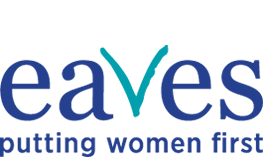“A closed door society”: Women describe their struggle to “Settle In” to British society

New Research from Eaves – “Settling in”: Experiences of Women on Spousal Visas in the UK
Women from all over the world might find themselves in a relationship with a British national and ultimately coming to settle as a spouse or partner, have children together and make a permanent life here. Who are these spouses or partners? What is it like trying to settle in to UK life in this way? What does “integration” mean to these individuals as opposed to the policy makers and academics who normally define the term? These are some of the questions addressed in new research by Eaves.
The research, funded by the European Integration Fund, took place over a 20 month period and held focus groups and interviews with 96 women from 32 countries and 40 other stakeholders across London and the South East.
Research and development manager, Heather Harvey, said; “It’s amazing really, the women were enormously varied yet no matter where they come from, they faced very similar challenges about trying to settle in to the UK. Of course many hurdles are substantial but we were struck by how, in fact, it was often really small and simple things that could make all the difference in helping women to know their way around in the UK.”
“It would never occur to us, for example, that a woman could enrol at the GP but delay attending until she was much more seriously ill because she hadn’t understood she had access to free care. It would never cross our minds that a woman might think the emergency number was 911 rather than 999 because she’d obtained her information from watching American films.”

Key findings
The findings include the fact that over 90% of women had completed formal education and 58% have one or more graduate or post graduate level qualifications. However usually these skills, experience and qualifications are not recognised by employers or colleges resulting in, as one woman said, “A waste of talent and skills.”
“I am a lawyer, I have seven years experience, I have a Masters degree…but because I come from Mexico… they don’t trust that…it’s just insane.”
Women wanted to work and many women were under-employed and volunteering just so that they were doing something, gaining experience that UK employers might respect and meeting people. Lack of access to childcare and language classes however were major barriers for many women trying to volunteer, take up education and employment and build a social life.
Although 90% of the women interviewed had managed to make friends in the UK, they generally had found it very hard, or impossible, to make friends with British people. Some women put this down to our weather, which doesn’t encourage lingering and chatting in streets and parks, and others to our reserved culture. Whatever the cause, women described great difficulties in being accepted by the British;
*“Sometimes the British are so polite that you don’t know what they’re thinking.” *
*“A closed door society” *
“Back in my country, even when you are on the bus or train, when you sit down next to people, you just chat.”
“It doesn’t matter how much you feel that you’re integrated, if the other party show you that you are not…”
Researcher, Nisan Zerai Kesete said, “the women had really thought about what integration meant, they live it – and in fact they put it better than we can, for instance one woman summed it up like this:
“I think there are three parts to integration. I think number one is having the ability to participate in the cultural, social, economic and political system. Number two would be to have the ability to accept the cultural norms, rules and regulations of the system that you’re part of. Number three would be, being able to create your own space in a system that initially had no space for you. So coming here and making it your own you know? I think that would be integration for me as an all encompassing definition.”
The full report will be launched over two events in London.
Thursday 18th June 2015, 5.15pm – 6.45pm at St Luke’s Community Centre, 90 Central Street, London, EC1V 8AJ (near Old Street tube)
AND
Monday 22nd June 2015, 5pm – 6.30pm at Waterloo Action Centre, 14 Baylis Road, London, SE1 7AA (near Waterloo station)
Contact: Danielle Thom to book your place at this FREE event [email protected]
How you can help Get inspired with fundraising ideas or join one of our fundraising events...
Join our campaigns Visit the Campaigns section to find out more...
Sign up for our newsletter Stay up to date with our supporters, campaigns and consultations...




